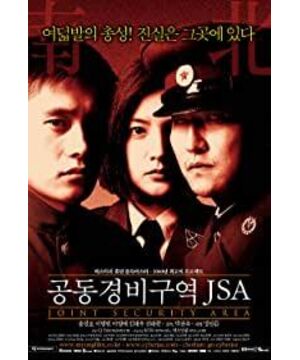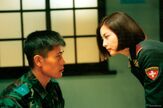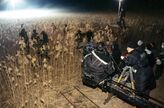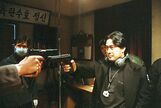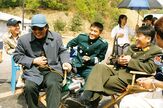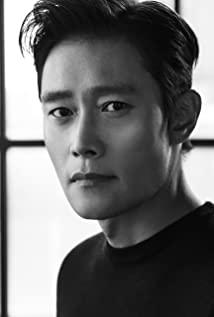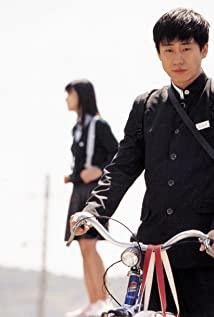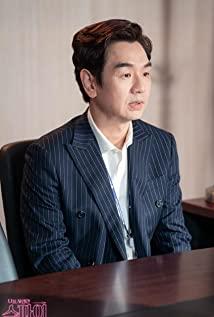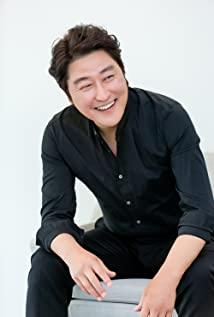As a leader among many "North-South films", Park Chan-wook's "Common Security Zone" was filmed in 2000. At that time, the aftermath of "Life and Death" had not yet dissipated. The market's response to the audio-visual language and story structure was based on Hollywood and Hong Kong films. , there is a strong demand for genre films with themes and Korean local characteristics. As a director, Park Chan-wook, who has never been able to come up with a decent work, took over this proposition composition almost out of desperation in order to give himself the opportunity to continue shooting his ideal movie. And his unique views on the war and the North-South issue, let people see the huge difference between the master and the craftsman. When others used the big scene of artillery fire or the death of the close relatives to deliberately stir up emotions, accusing the war of cruelty and ruthlessness, Park Zanyu only It took a few bullets to make the audience feel the absurdity of politics and the impermanence of life. A "Common Security Zone" with too many "private goods" saved Park Zan-wook, who was half-dead in his directorial career, and this led to the "revenge trilogy" that later made him more famous.
When it comes to the five master directors Kim Lee Hong and Park Bong that are recognized internationally in South Korea, the names of the latter two are always mentioned together, and some people even invented the term "Park Bong-sae", which is not only due to Park Chan-wook The frequent cooperation between Feng Junhao and Feng Junhao, their common aesthetic pursuit, their deep thinking about realistic themes and the essence of human nature behind them, and even the radicalism and violence conveyed in the images are all mentioned by their names at the same time. reason. If you compare Feng Junhao's famous work "Memories of Murder" back then, you will find that the concept conveyed by "Common Security Zone" is surprisingly similar to it. The anti-type experiment under the banner of the genre film, as well as the reflection on the word truth, runs through the two films from beginning to end.
What the "Common Security Zone" wants to reveal is the truth of a murder incident, which is an almost negligible cut for the conflict of interests between one nation and two countries. However, because the location of the murder occurred on the border of Panmunjom, this means that there is a lot of mystery under the incision. In the seemingly heavy background, but with such subtle conflicts to develop the story, from the political film to the small-scale suspense film, Park Zanyu made people see his difference from the beginning. As Sophie's investigation gradually deepened, the statements of both parties gradually surfaced, and it seemed that this would be a "Rashomon"-style unfolding. However, the story suddenly returned to the original point at this time, and the disrupted timeline made the film jump out of the rhythm of the suspenseful mystery film. The paragraphs describing the emotional changes of the soldiers from the north and the south occupy nearly half of the film, from the mortal enemy who cannot tolerate each other to the brothers who raise a glass and drink together. In the seemingly trivial narrative, there are a lot of carefully designed details, which I didn't notice when I first watched it. But secretly save energy for the final tragedy. For example, Lee Byung-hun's super-fast gun drawing speed, the Korean rock music Song Kangho listened to, and Lee Byung-hun's partying with a piece of chocolate to persuade Song Kangho to surrender, the influence of these incidents are all piled up in the gun-drawing confrontation at the last post, for each character's motivation and relationship. The ending makes the best explanation.
The confrontation in the post is undoubtedly the most praiseworthy segment of the film, because it is both related to the truth of the whole story and the concentrated outbreak of all the previous preparations. In the cramped hut, five soldiers, two doctrines, and five ideas eventually turned into sixteen bullets, which turned into a tragedy of friends killing each other. Self-preservation, the country, the individual, and the overall situation, the collision of ideas is transformed into the collision of bullets, which shatters the friendship that was established in a moment on the battlefield, and also makes people doubt the meaning of exploring the truth. Similar to "Memories of Murder" and "Mother", the film's telling of the final truth is essentially ambiguous. The director seems to intentionally remind the audience that the truth shown in the images may not be the truth in reality, otherwise it will be impossible to explain the truth. The reason why Hee and Lee Byung-hun committed suicide in turn. Obviously, like Feng Junhao, Park Zanyu himself is extremely pessimistic about the term truth. The process of exploring the truth often brings results that are far from the truth, and the so-called truth may not only subvert the truth itself. , but also means a challenge to human relations, emotions and many other factors.
The last shot of the film is very meaningful. The shot first freezes on Song Kangho's dull face, making people mistakenly think that it is him who was in a trance after the incident, but then the camera moves and there is a smiling Shin Ha Kyun in the background, and then he leans against the wall. Song Hee, looking at Song Kangho's Lee Byung Hun. It turned out that they were still alive at that time, and at that time, they were still friends. A photo, a horizontal line, two worlds, separated by an unrecognizable truth.
View more about Joint Security Area reviews


